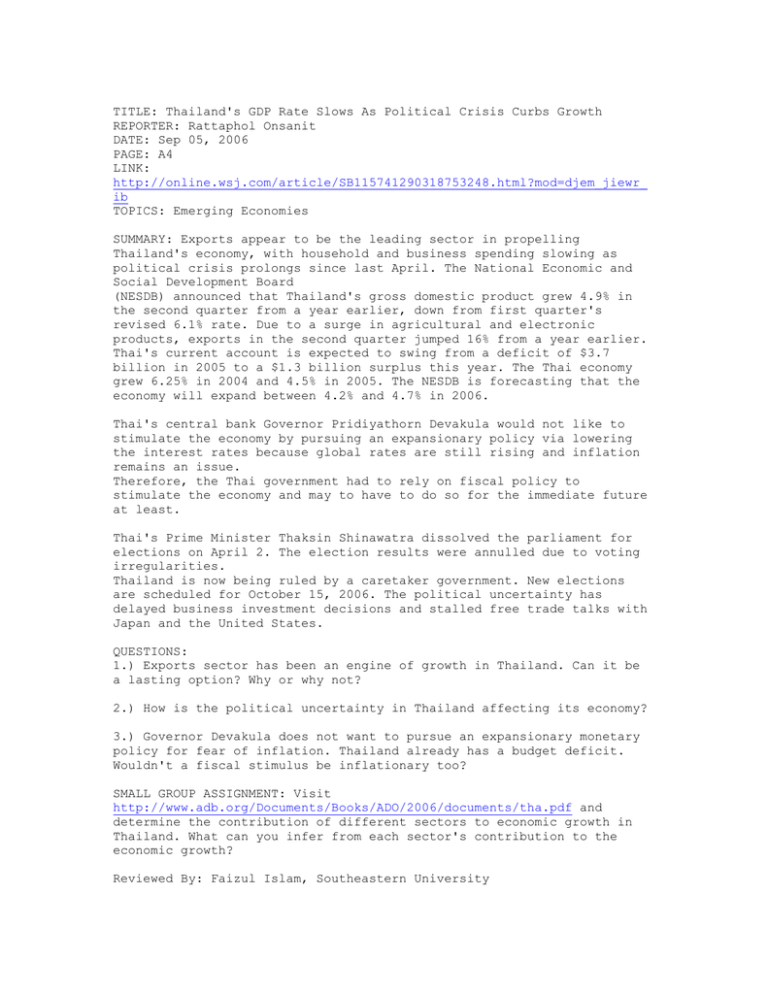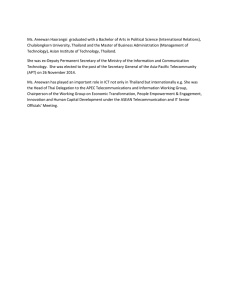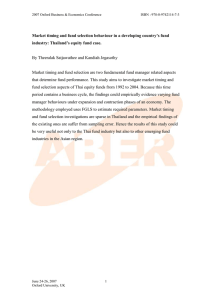
TITLE: Thailand's GDP Rate Slows As Political Crisis Curbs Growth
REPORTER: Rattaphol Onsanit
DATE: Sep 05, 2006
PAGE: A4
LINK:
http://online.wsj.com/article/SB115741290318753248.html?mod=djem_jiewr_
ib
TOPICS: Emerging Economies
SUMMARY: Exports appear to be the leading sector in propelling
Thailand's economy, with household and business spending slowing as
political crisis prolongs since last April. The National Economic and
Social Development Board
(NESDB) announced that Thailand's gross domestic product grew 4.9% in
the second quarter from a year earlier, down from first quarter's
revised 6.1% rate. Due to a surge in agricultural and electronic
products, exports in the second quarter jumped 16% from a year earlier.
Thai's current account is expected to swing from a deficit of $3.7
billion in 2005 to a $1.3 billion surplus this year. The Thai economy
grew 6.25% in 2004 and 4.5% in 2005. The NESDB is forecasting that the
economy will expand between 4.2% and 4.7% in 2006.
Thai's central bank Governor Pridiyathorn Devakula would not like to
stimulate the economy by pursuing an expansionary policy via lowering
the interest rates because global rates are still rising and inflation
remains an issue.
Therefore, the Thai government had to rely on fiscal policy to
stimulate the economy and may to have to do so for the immediate future
at least.
Thai's Prime Minister Thaksin Shinawatra dissolved the parliament for
elections on April 2. The election results were annulled due to voting
irregularities.
Thailand is now being ruled by a caretaker government. New elections
are scheduled for October 15, 2006. The political uncertainty has
delayed business investment decisions and stalled free trade talks with
Japan and the United States.
QUESTIONS:
1.) Exports sector has been an engine of growth in Thailand. Can it be
a lasting option? Why or why not?
2.) How is the political uncertainty in Thailand affecting its economy?
3.) Governor Devakula does not want to pursue an expansionary monetary
policy for fear of inflation. Thailand already has a budget deficit.
Wouldn't a fiscal stimulus be inflationary too?
SMALL GROUP ASSIGNMENT: Visit
http://www.adb.org/Documents/Books/ADO/2006/documents/tha.pdf and
determine the contribution of different sectors to economic growth in
Thailand. What can you infer from each sector's contribution to the
economic growth?
Reviewed By: Faizul Islam, Southeastern University
September 5, 2006
DOW JONES REPRINTS
This copy is for your personal, non-commercial use only. To order
presentation-ready copies for distribution to your colleagues, clients or
customers, use the Order Reprints tool at the bottom of any article or visit:
www.djreprints.com.
• See a sample reprint in PDF format.
• Order a reprint of this article now.
Thailand's GDP Rate Slows
As Political Crisis Curbs Growth
By RATTAPHOL ONSANIT
September 5, 2006; Page A4
BANGKOK, Thailand -- Thailand's economic growth is largely being sustained by
exports, with local consumption and investment slumping as a months-long
political crisis drags on.
The National Economic and Social Development Board said gross domestic
product in the second quarter increased 4.9% from a year earlier, slowing from the
first quarter's revised 6.1% rate.
Exports in the second quarter jumped 16% from a year earlier, buoyed by
agricultural and electronic products, the planning agency said.
Thailand has been run by a caretaker
government since Prime Minister Thaksin
Shinawatra in the first quarter dissolved
Parliament for elections, which were held
April 2. The results of the vote later were
annulled because of irregularities, blurring
the political picture and leading many
businesses in Thailand to delay investment
decisions. Free-trade talks with Japan and
the U.S. also are on hold until a new
government can be elected.
New elections are scheduled for Oct. 15 but
might be delayed while election
commissioners are chosen.
For the second quarter, a significant
adjustment to account for a slowdown
between the dry season and the rainy
season, along with strong exports, raised
quarter-to-quarter growth to 1%, compared
with 0.8% in the first quarter.
But on an annualized basis, growth in
Thailand has slowed. And for the second half, the development board expects
growth to slow to around 4% from a year earlier compared with 5.5% in the first
half. The agency also narrowed its forecast for 2006 GDP growth to between 4.2%
and 4.7%, from between 4.2% and 4.9%. The Thai economy expanded 4.5% last
year, slowing from 6.2% in 2004.
Despite the weaker year-to-year growth in the second quarter, central bank Gov.
Pridiyathorn Devakula said interest rates won't be cut soon because global rates are
still rising and inflation remains a concern, so fiscal stimulus is the best way to
boost economic growth for now.
Government spending was one of the secondary drivers of growth in the second
quarter, development board head Ampon Kittiampon said yesterday. The
disbursements will probably continue into the second half, Mr. Ampon said,
although legislative approval for the budget for the next fiscal year, which starts
Oct. 1, is likely to face delays.
Analysts said the main casualty of political uncertainty has been business
confidence and investment. The situation has been exacerbated by weak consumer
spending caused by higher prices and interest rates.
"Thailand is in a risky position in the coming quarters, as exports have become the
single main driver, while private and government investment have come under
pressure," said Thanawat Patchimkul, head of research at DBS Vickers Securities.
In the second quarter, growth in private investment slowed to 3.6% from a year
earlier. In the first quarter, it increased 7.2%.
The development board said private investment might not pick up until Thailand
holds fresh elections and forms a government, restoring confidence among
investors. The shortage of new investment could cut consumption further by
reducing the employment prospects and incomes of the working classes, it said.
"We are starting to see signs of a slowdown in private investment. We need to
assure investors that all the government projects will go ahead" after a new
government is formed, Mr. Ampon said.
With inflation and economic growth slowing, many analysts said they expect the
central bank's Monetary Policy Committee to leave its 14-day repurchase rate at
5%.
Mr. Ampon said the agency's forecast for headline inflation this year remains at
4.5% to 4.7%, assuming Dubai oil prices stay in the expected range of $65 to $68 a
barrel this year. Dubai crude for delivery in two months was quoted early yesterday
at $65.04 a barrel.
In August, the inflation rate in Thailand was 3.9%. The rate in May was 6.2%.
The planning agency forecasts that strong export and tourism revenue will help the
current account swing to a surplus of $1.3 billion this year from a deficit of $3.7
billion last year, helping to keep the baht firm.
The total number of foreign tourists arriving in the second quarter was 3.23 million,
compared with 3.63 million in the first quarter and 2.51 million a year earlier.
---- Ambika Ahuja contributed to this article.
Write to Rattaphol Onsanit at rattaphol.onsanit@dowjones.com1
URL for this article:
http://online.wsj.com/article/SB115741290318753248.html
Hyperlinks in this Article:
(1) mailto:rattaphol.onsanit@dowjones.com
Copyright 2006 Dow Jones & Company, Inc. All Rights Reserved
This copy is for your personal, non-commercial use only. Distribution and use of
this material are governed by our Subscriber Agreement and by copyright law.
For non-personal use or to order multiple copies, please contact Dow Jones
Reprints at 1-800-843-0008 or visit www.djreprints.com.



